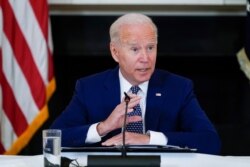For more than a year, the independent media in Belarus have been under assault, with a far-reaching campaign of arrests and legal pressure that has made it nearly impossible for journalists to operate.
In addition to headline-grabbing actions like diverting a plane to arrest activist blogger Raman Pratasevich, which resulted in a series of European Union sanctions, authorities have detained nearly 500 journalists in the past year. Of those, 29 remain behind bars, data from the Belarusian Association of Journalists (BAJ) shows.
Authorities have raided newsrooms and journalists’ homes, stripped correspondents of accreditation, blocked access to news websites including the popular Tut.by, and applied legal pressures to civil society, including the BAJ.
The Minsk-based organization is one of about a dozen rights groups being forced to close after the Justice Department announced moves to liquidate it. A court today dissolved freedom of expression organization PEN Belarus. The moves came as President Alexander Lukashenko said he planned to “cleanse” Belarus of nonprofits, saying they are “bandits and foreign agents.”
The crackdown on media began ahead of the Aug. 9, 2020 elections and escalated after Lukashenko claimed victory even as members of the opposition were jailed or forced to flee.
Zmitser Mitskevich, a Belarusian journalist now in Poland, described that first week as “brutal.”
“The media are considered the biggest threat by Lukashenko,” Mitskevich told VOA. “He considers them to be personal enemies for him. So, that's why he wants to eliminate all of them out of the country.”
The Belsat TV reporter was briefly detained before and after the election as he covered events or livestreamed unrest.
A joint report by media watchdog Reporters Without Borders (RSF) and the Swiss-based World Organization Against Torture said that Lukashenko has implemented a “system of repression that has been imposed with the aim of silencing journalists.”
The report described dozens of violent confrontations with police, including reporters being hit by rubber bullets, or in the case of Hrodna.life reporter Ruslan Kulevich, denied medical treatment for fractures to both hands after he was beaten with batons and detained for two days.
“Journalists battling to inform their fellow citizens and the rest of the world about events in Belarus have been hounded for the past year, as have their families,” Jeanne Cavelier, the head of RSF’s Eastern Europe and Central Asia desk, said in a statement. “(They) have been subjected to relentless physical, psychological, judicial and economic persecution.”
The deteriorating situation resulted in Belarus falling five places in RSF's 2021 World Press Freedom Index, ranking 158 out of 180 countries, where 1 is freest.
The Belarusian embassy in Washington did not respond to VOA’s email requesting comment.
U.S. President Joe Biden on Monday issued an executive order allowing for more sanctions on Belarus.
“It is the responsibility of all those who care about human rights, free and fair elections, and freedom of expression to stand against this oppression,” Biden said in a statement.
The mass jailing of civil society and journalists are “an affront to global norms” and “an illegitimate effort to hold on to power at any price,” the statement added.
Britain and Canada also imposed sanctions on Belarus.
Responding to the international pressure, Lukashenko told a BBC reporter Britain can “go choke” on sanctions, while accusing the British of being “American lapdogs.”
Many of the arrests are arbitrary, with journalists released after a relatively short period. But others have been held for more than a year, including Ihar Losik, a blogger and social media consultant for Radio Free Europe/Radio Liberty (RFE/RL), who was arrested in June 2020 for allegedly inciting unrest on social media.
Two other RFE/RL journalists were briefly detained last month and the network’s offices in the capital, Minsk, were raided.
The network’s president, Jamie Fly, said in a statement that the moves “testify to the despotic desperation of the Lukashenko regime to cling to power at all costs.”
In some cases, Belarus has handed down sentences. Belsat TV journalists Darya Chultsova and Katsiaryna Andreyeva were sentenced to two years in prison after their arrests while filming the protests.
The Belarusian reporters are among the 2021 Courage in Journalism awardees recognized by the U.S.-based International Women’s Media Foundation.
“What's unique about the winners this year is that they are all being held to account for covering situations in their own homes,” IWMF executive director Elisa Lees Munoz told VOA. “The winners from Belarus are fighting an authoritarian regime that is brutally cracking down on journalists, and for that they are currently in prison.”
Alongside Chultsova and Andreyeva, the IWMF recognized American photojournalist Vanessa Charlot for her coverage of protests over the death of George Floyd, a Black man killed in police custody last year; Peruvian investigative reporter Paola Ugaz who faced death threats and lawsuits over her reporting on an organization affiliated with the Catholic Church; and Khabar Lahariya, an all-female Dalit newsroom pushing back against India’s cultural and societal barriers.
“It’s so important to recognize the incredible work that journalists do around the world, the lengths that they go to report the stories, the fact that they're often risking their lives and sometimes putting their families at risk just to get us the truth,” Munoz said.
The sentiment was shared by Andreyeva’s colleague Mitskevich, who worked alongside her in the first weeks after Belarus’s contested election. The Belsat journalists covered the protests, documenting police brutality, searching the city for working internet connections to upload footage, and trying to avoid arrest.
Throughout, Mitskevich said, he was impressed by Andreyeva’s dedication and bravery. He recalled how in that first week, she fainted from exhaustion after trying to cover everything that was happening.
“It can tell you much about her that she wants to be everywhere, and she wants to show people as much as possible,” Mitskevich said. “She's really devoted to this profession.”
Andreyeva was arrested along with her Belsat TV colleague, Chultsova, in Minsk in November as they livestreamed a rally over the death of a protester.
With the risk of arrest high, many journalists have left for nearby countries so they can continue to report.
Mitskevich, who is currently in Warsaw, Poland, said he and his colleagues rely on citizens to send in information, videos and other content, saying, “These protests are covered by the people themselves.”
Despite the risks, and seeing colleagues and friends jailed or attacked, Belarus media and its new citizen journalists are committed to keep shining a light on events back home.
“We're motivated by love to our job, and love to what we're really doing,” Mitskevich said. “We want our country to be a normal country finally, so we want to show the truth to the people.”
Jesusemen Oni contributed to this report.








